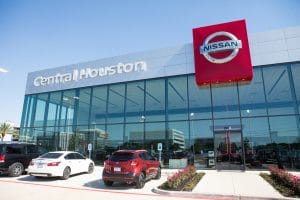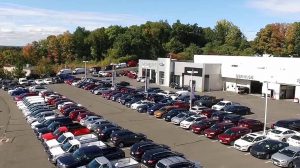
Auto dealers across the U.S. have furloughed or let go about 300,000 employees during the pandemic, and they’re not all coming back..
(This story has been revised to note the correct number of CarMax employees.)
About 300,000 employees at U.S. franchised dealerships were terminated or furloughed due to the coronavirus pandemic. While some have returned to work as retail sales rebound, the crisis is expected to have a long-term impact on tens, perhaps even hundreds of thousands of automotive retail workers.
The short-term impact of the pandemic was severe, showrooms across the U.S. closing their doors or scaling back operations. But many also shifted to online sales, something expected to have a significant impact on the future of the business, according to most industry experts.
“Consumers really like the experience of shopping online,” Michelle Krebs, an analyst with Cox Automotive, said during a mid-year update on the U.S. auto industry. “We believe they will expect to stay with this way of doing business, and may even be willing to pay a little more.”
(Ford promises to help by taking back newly leased, purchased vehicles.)
According to Cox Research, 58% of those who purchased online said the experience was “much” or “somewhat” better than the traditional buying process. Only 6% said it was “worse.”

Buyers have taken to the online shopping experience for new vehicles in impressive numbers, meaning the retail experience is going to change.
That’s one of the key reasons why the retail side of the car business is likely to change dramatically and will likely see a decline in the number of showroom staff. Most experts believe there won’t be a one-for-one replacement with workers handling online sales.
“There’s been so much unknown,” Shari Sandidge, the head of family-run Miller Buick-GMC, in Woodbridge, New Jersey, told trade publication Automotive News. “There’s no book to tell you what to do, and so we’ve really had to take it one step at a time.”
There is likely to be little clarity anytime soon, according to analyst Krebs and others. The pandemic exacerbated what was already supposed to be a down year when much of the country went into lockdown in March. New vehicle sales tumbled nearly 40% that month and fell by almost half in April. May saw a modest recovery and June is looking still better. But most industry forecasts still see demand down in the high-12 to mid-13 million range for all of 2020, at least a 20% drop from 2019.
And that’s assuming the current wave of new coronavirus outbreaks doesn’t continue to worsen, said Cox’s chief economist Jonathan Smoke. And demand could get worse, he added, if “key portions” of the federal economic stimulus plan, such as $600 weekly addition to unemployment, are allowed to expire.
But even under the best circumstances, the U.S. market isn’t expected to come close to the peaks of recent years until close to mid-decade.
(Toyota sees retail market bouncing back fast, but warns there could be “lumps” ahead.)
Whatever the reason, the overall number of jobs at U.S. dealerships is likely to shrink by anywhere from 5 to 10% post-pandemic, Adam Robinson, the CEO of recruitment firm Hireology, told Automotive News. Considering the National Automobile Dealers Association estimated employment totaled around 1.1 million last year, that could mean a loss of as many as 100,000 jobs. And, for others, work assignments could chance dramatically. The biggest changes are expected to come in public facing roles, such as sales.
The job cuts that followed the broad lockdown reached across the industry, impacting both ma-and-pa retails, such as Miller Buick-GMC, and the mega-dealers who increasingly dominate the business.

The traditional car buying experience will still be available to those who are more comfortable with it, but the internet will reduce those numbers.
While AutoNation, the largest public chain, has recalled half of the 7,000 employs furloughed in April, about 14% of its total workforce is going to be permanently cut.
Second-largest chain Penske Automotive Group temporarily idled 5,300 in its U.S. dealer network and plans to eliminate 500 jobs permanently.
Similar stories are emerging from new car retailers like Sonic Automotive, Lithia Motors and the Asbury Automotive Group, as well as used car enterprises such as CarMax, the largest company in its sector, which put 15,500 of its 25,500 employees on furlough. Despite the rapid recovery of the previously owned vehicle market – which has rebounded much faster than the new car side of the business — nearly 15% of them still remain off the job.
“The changes” to the retail automotive sector “were really accelerated by the pandemic,” said Krebs. That was echoed by Mark LaNeve, head of sales, service and marketing for Ford, who told TheDetroitBureau.com that the shift to online car buying is at least three years ahead of where he otherwise expected it to be.
(Automakers continue to delay product launches in wake of pandemic.)
With showrooms in most of the country now open again, some business is switching away from the web. But few expect to see a business-as-usual reversion. And the changes set in motion over the last three months are certain to mean a much leaner job market going forward.


Just as well as these dealer folks lose their jobs. They have been ripping off buyers for decades. What goes around comes around. Learn to code.